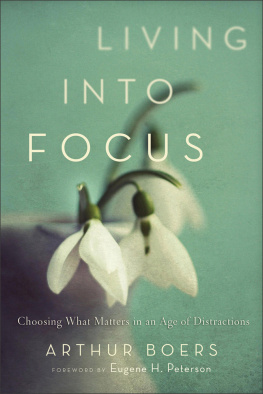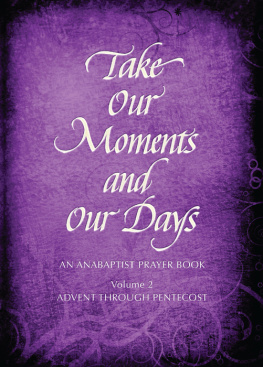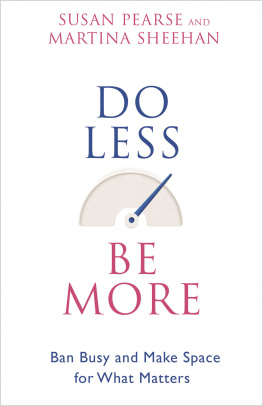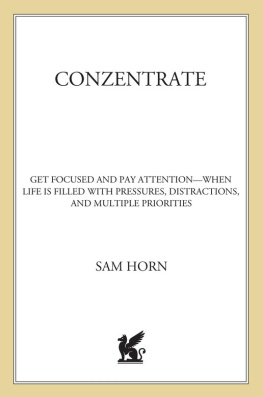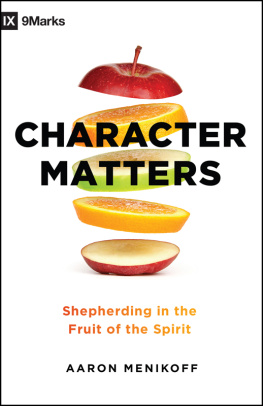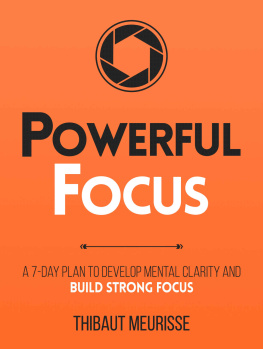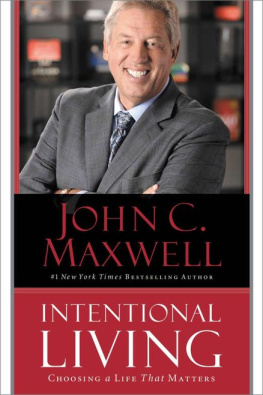Arthur Boers - Living Into Focus: Choosing What Matters in an Age of Distractions
Here you can read online Arthur Boers - Living Into Focus: Choosing What Matters in an Age of Distractions full text of the book (entire story) in english for free. Download pdf and epub, get meaning, cover and reviews about this ebook. year: 2012, publisher: Baker Publishing Group, genre: Home and family. Description of the work, (preface) as well as reviews are available. Best literature library LitArk.com created for fans of good reading and offers a wide selection of genres:
Romance novel
Science fiction
Adventure
Detective
Science
History
Home and family
Prose
Art
Politics
Computer
Non-fiction
Religion
Business
Children
Humor
Choose a favorite category and find really read worthwhile books. Enjoy immersion in the world of imagination, feel the emotions of the characters or learn something new for yourself, make an fascinating discovery.
- Book:Living Into Focus: Choosing What Matters in an Age of Distractions
- Author:
- Publisher:Baker Publishing Group
- Genre:
- Year:2012
- Rating:3 / 5
- Favourites:Add to favourites
- Your mark:
- 60
- 1
- 2
- 3
- 4
- 5
Living Into Focus: Choosing What Matters in an Age of Distractions: summary, description and annotation
We offer to read an annotation, description, summary or preface (depends on what the author of the book "Living Into Focus: Choosing What Matters in an Age of Distractions" wrote himself). If you haven't found the necessary information about the book — write in the comments, we will try to find it.
Arthur Boers: author's other books
Who wrote Living Into Focus: Choosing What Matters in an Age of Distractions? Find out the surname, the name of the author of the book and a list of all author's works by series.
Living Into Focus: Choosing What Matters in an Age of Distractions — read online for free the complete book (whole text) full work
Below is the text of the book, divided by pages. System saving the place of the last page read, allows you to conveniently read the book "Living Into Focus: Choosing What Matters in an Age of Distractions" online for free, without having to search again every time where you left off. Put a bookmark, and you can go to the page where you finished reading at any time.
Font size:
Interval:
Bookmark:

2012 by Arthur Boers
Published by Brazos Press
a division of Baker Publishing Group
P.O. Box 6287, Grand Rapids, MI 49516-6287
www.brazospress.com
Ebook edition created 2011
All rights reserved. No part of this publication may be reproduced, stored in a retrieval system, or transmitted in any form or by any meansfor example, electronic, photocopy, recordingwithout the prior written permission of the publisher. The only exception is brief quotations in printed reviews.
ISBN 978-1-4412-3629-6
Library of Congress Cataloging-in-Publication Data is on file at the Library of Congress, Washington, DC.
Published in association with the literary agency of Alive Communications, Inc., 7680 Goddard Street, Suite 200, Colorado Springs, CO 80920, www.alivecommunications.com.
Scripture quotations are from the New Revised Standard Version of the Bible, copyright 1989, by the Division of Christian Education of the National Council of the Churches of Christ in the United States of America. Used by permission. All rights reserved.
All illustrations are by Margreet de Heer and are used with permission.
To
Albert Borgmann
Eugene Peterson
and David Wood
No one Id rather be with.
O ne of the disturbing features of contemporary culturesome think it qualifies as most disturbingis the extent to which modern technology is impoverishing the way we live. Many voices have been raised in the last fifty years calling attention to the devastation being wreaked on our lives by our indiscriminate and undiscerning embrace of technology.
Arthur Boers is one of these voices. He has identified the Montana philosopher Albert Borgmann as a major prophet of our times with a remarkable ability to separate the chaff in our culture from the grain, and Boers has taken him on as a mentor. For several years he has absorbed Borgmanns philosophical analyses and concerns and in this book has written a kind of journal of his own personal taking up with the world (Borgmanns phrase) in ways that contribute to a life of wealth and enrichment.
In the middle of the nineteenth century, when technology was not nearly as advanced and omnipresent as it is now, Henry David Thoreau was alarmed when he observed that so many people were living lives of quiet desperation. He responded by constructing and then living in a small cabin on Walden Pond to see if it was possible to live a life of simplicity and wealth in a culture of increasingly depersonalized and demeaning clutter. His witness to his life in that cabin, Walden , is an enduring monument to the fact that it is possible.
Arthur Boers in this book gives a similar witness, but in a very different setting. One difference is that since the days of Thoreau technology has penetrated virtually every area and detail of our lives. For most of us there is no escaping it, nor would we want to, for it brings many goods and conveniences into our lives. But a more significant difference between Walden and this book is that Dr. Boers does not radically separate himself from the world of technology by living alone on a New England pond. He has married and raised a family, he is a professor and a pastor, he owns and drives a car, has central heating in his home, carries a watch and uses a computer.
The usefulness of this book is not in its arguments or preachments (there is virtually none of that) and not in doomsday warnings and irritable complaints (these are also absent) but in its witness, the actual practices that develop into a coherent way of life, practices that any of us can embrace, practices that engage with things local, practices that nurture personal friendships, practices that maintain a close and friendly relationship with the terrain and weather in the place where we live.
It is important also to say what this book is not. It is not a book of condescending advice or a blueprint for imposing suggestions or plans for a wholesale renovation of a life that is out of control. Rather, it is a personal working through and reflection on the difficulties of swimming against the stream of contemporary culture and at the same time developing the focal practices that enable any one of us to revel in the good life that the Christian way invites us into.
Jesus famously said, I have come that they may have life, and have it more abundantly (John 10:10). Or to put it more directly in the second person, I have come that you might live a generous life.
Despite its staggering achievements in raising our standard of living, our technology-dominated society is impoverishing far too many lives. The good life, the generous life, the abundant life has obviously eluded technology.
This is a huge irony. We live in a society that has achieved a standard of living that surpasses the wildest dreams of most of the people in the history of the world; the most conspicuous result is that far too many of us live poor, thin, trivializing lives. Advanced technology is the most prominent feature of contemporary life. It is glittering and glamorous. It disburdens us of laborious and grueling labor, promises an easier life, a more leisurely life. But there are dangers hidden in the glitter that betray the promises it offers.
So we learn to distinguish between standard of living and wealth. Standard of living simply means more money, faster cars, and bigger houses. Wealth comprises living well, having friends, exercising compassion, enjoying and celebrating goodness and beauty, and worshiping God. The concern of Dr. Boers is not to eliminate technology but to restrain technology so that it doesnt ruin our lives by depersonalizing them, disengaging us from the immediate everydayness of things and persons. For many years now, he has embraced Borgmanns passion for living a generous life. He has put the philosophers diagnosis and concerns into practice in the context of his own life and work. This book is his personal witness to the practices that develop into a life of wealth, of generous abundance.
Most of us know far more about the Christian faith than we manage to live. There is no lack of words in the Christian community these days regarding spiritual formation, finding ways to think adequately about the Father, Son, and Holy Spirit, and receiving all the operations of the Trinity. Arthur Boers takes all this a step further. He takes what we know into our neighborhoods and backyards, our homes and workplaces. He then helps us get it all into our bones and muscles, our nerve endings and synapses as we drive our cars, use our computers, work our gardens, cook our meals, and eat together.
Eugene H. Peterson
Professor Emeritus of Spiritual Theology
Regent College, Vancouver, British Columbia
T hree friends in particular inform and inspire this book: Albert Borgmann, Eugene Peterson, and David Wood. I am grateful for the many ways that our lives intersect and how our friendships came to involve their spouses, Jan Peterson, Jennifer Wood, and the late Nancy Borgmann. These six people do not just talk the talk or dream the dreamsthey embody the priorities, potentials, and practices of focal living.
I appreciate how Albert Borgmann gave generously of his time in correspondence, telephone conversations, and face-to-face meetingseven venturing to the Elkhart Consultation (2008) at Associated Mennonite Biblical Seminary (AMBS) with professors, pastors, writers, and activists to discuss the implications of focal living.
Eugene Peterson has been unstintingly supportive of this project in his regular pastoral inquiries about its progress, encouragement of my writing, examination of the books ideas, reading of the manuscript, and generous foreword.
Font size:
Interval:
Bookmark:
Similar books «Living Into Focus: Choosing What Matters in an Age of Distractions»
Look at similar books to Living Into Focus: Choosing What Matters in an Age of Distractions. We have selected literature similar in name and meaning in the hope of providing readers with more options to find new, interesting, not yet read works.
Discussion, reviews of the book Living Into Focus: Choosing What Matters in an Age of Distractions and just readers' own opinions. Leave your comments, write what you think about the work, its meaning or the main characters. Specify what exactly you liked and what you didn't like, and why you think so.

